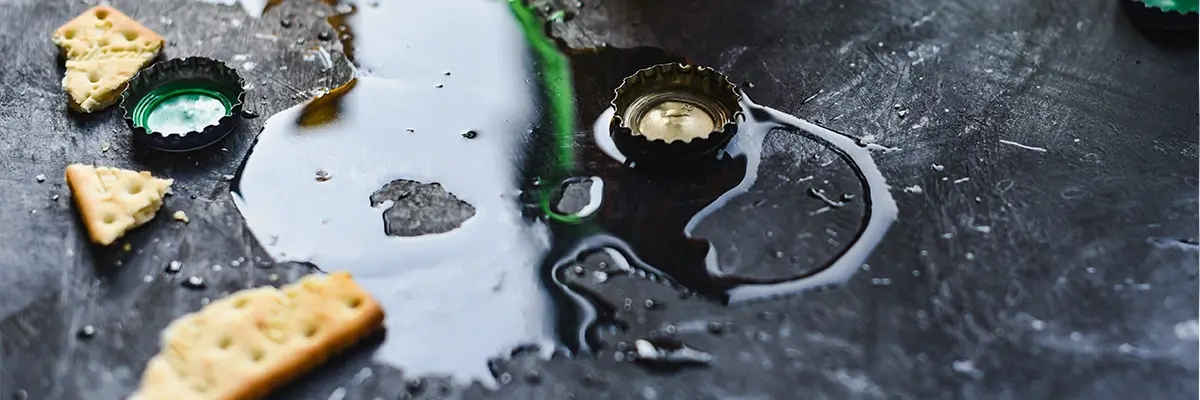Alcohol use disorder is a serious condition that affects millions of people. It can also impact family and loved ones. Having a parent who suffers from alcohol abuse issues can be tough, but there are ways to help. Here are some of the ways you can help an alcoholic parent.

What Is Alcohol Use Disorder?
Alcohol use disorder is a condition characterized by a reduced ability to control the consumption of alcohol. A person with alcohol use disorder (AUD) may continue to drink heavily regardless of any negative consequences it may be having on their health, social life, or finances.
Over time, AUD can also change the way the brain functions, making it even harder to stop drinking. A diagnosis for AUD usually involves a clinical assessment, which will take into account how much and how often someone drinks. These assessments also look into the level of craving, the impact the drinking has on responsibilities, as well as any health impacts it may have.
According to the National Institute on Alcohol Abuse and Alcoholism (NIAAA), over 14 million Americans over the age of eighteen suffer from alcohol use disorder.

Risk Factors That Can Lead to Alcohol Abuse
While anyone can at some point develop a drinking problem, certain factors can increase the chance of addiction.
One influencing factor is the existence of another substance abuse issue or addiction. This might include addiction to prescription drugs, illicit substance abuse, or addiction to something like gambling. A 2017 survey by the Substance Abuse and Mental Health Services Administration (SAMHSA) showed that around 2.3 million people had both an alcohol use disorder and a substance use disorder simultaneously in the past year.
Drinking alcohol at an early age, especially binge drinking, can also increase the chances of developing alcoholism later in life. A recent study conducted by a team from the University of Michigan followed a group of adolescents for seventeen years into their mid -30s to track alcohol use trends. After seventeen years, the study found that children or adolescents who drank by themselves were 35% more likely to develop symptoms of alcohol use disorder by the age of 35.
There is also the case that certain hereditary factors may make someone more likely to develop alcoholism. The influence of genetics on AUD is complex, and more research is needed. What is important to note is that alcohol abuse is not something that is definitely passed down from parent to child. A combination of environmental factors and genetic predispositions is much more likely to be influential, rather than just hereditability.

Signs and Symptoms of Alcohol Abuse
It can sometimes be difficult to know if someone you care about has a drinking problem. Having accurate information can help. If you are worried that one of your parents may have an alcohol problem, here are some signs and symptoms to keep an eye out for.
Dependence and Withdrawal
One key sign to look out for is if a parent has a dependence on alcohol. Alcohol dependence is characterized by the onset of withdrawal symptoms when stopping drinking. Withdrawal symptoms can include:
- headaches
- tremors, especially in the hands
- nausea
- sweating
- trouble sleeping
- anxiety
- high blood pressure
- a rapid heartbeat
These symptoms can come on within a few hours and are often in line with a ‘hangover’, which are the symptoms someone might experience after becoming intoxicated. More long-term symptoms of withdrawal symptoms might include confusion, delusions, and even vivid hallucinations.
Signs of Addiction
These are some of the signs that a parent may suffer from alcoholism. One sign is if his or her drinking takes priority over things like work or family events. Are they choosing to drink instead of spending time with family members more often than not? This could be a sign that you have an alcoholic parent.
It is also important to note how much of an impact on their health it is having. Are they often hung over or do they drink to avoid withdrawal symptoms? Alcoholism can cause serious damage to organs such as the liver. Liver damage in turn can cause jaundice or a yellowing of the skin and eyes. Someone with liver damage may experience abdominal pains, swollen legs, as well as an overall loss of appetite and weight.
This kind of organ damage can not only result in complicated and debilitating health problems, but in some cases, it can threaten a person’s life. Recovery from serious liver damage is not always guaranteed, which is why it is so important to engage in alcohol rehab before there is too much injury.
Another sign of alcohol addiction is the amount that is being consumed. Many people like to share a beer or a glass of wine after work or with a meal, and this is not necessarily unhealthy or problematic. One potential sign of AUD could be binge drinking frequently. Binge drinking is often defined for men as consuming five or more alcoholic beverages in a two-hour period, and four or more drinks in the same period for women. This kind of drinking increases the risk of other problems developing, as well as pointing to a possible dependency.

Substance Abuse and Alcoholism
It is not uncommon for someone who suffers from alcoholism to also be affected by other substance use disorders (SUDs). This may involve the use of prescription drugs such as opiates or benzodiazepines, or illicit drugs such as heroin. Many alcoholics have a strong urge to get drunk or high one way or another and can find themselves taking dangerous substances or engaging in risky behavior as a result of their drug addiction.
How Are the Children of Alcoholics Affected?
According to a study published by the SAMHSA, around one in ten children in the United States live with an alcoholic parent or a parent who had suffered from AUD in the past year. This represents about seven and a half million children.
It can be very hard for the children of alcoholics to manage the situation and it is completely normal to have very strong feelings as a result. They might feel angry about the impact this has on the family, such as missed time together, financial problems, or arguing at home. It is also normal for family members to feel worried about a parent. Each person responds differently, but it ok to worry about a family member.
Bottling up these difficult feelings can have a negative impact on your own emotional well-being, so it is important to talk with someone about it. It could be that you speak with another family member about it, your friends, or even your friends’ parents. Finding another adult to help is important because it is not just the person suffering from AUD who needs emotional support, but their families too.
It can be the case that an alcoholic parent may be more intolerant of their child’s behavior, which in turn can harm their relationship. A lack of emotional availability that often results from drink or substance abuse issues in parents can also be difficult for their children to cope with. You might then see this child act out more at school or display similar behaviors such as aggression or even substance abuse.
There might be someone at school who can help put you in contact with someone who can help with your parent’s addiction, as well as take some of the burden off of your shoulders. While they may feel some responsibility to help an addicted parent quit drinking, it is not a child’s job to deal with an alcoholic parent alone.

How to Help an Alcoholic Parent
There are many ways to help a parent tackle their drinking problem. For example, it can mean a lot for some parents to hear from their own family members that they are worried. This should be done in a sensitive and caring way, and it is good to bear in mind that they may already be aware of the problem. You don’t want to make your parent feel like they are failing or a bad person, but instead, that treatment could help them have a better relationship with their family.
For some, it could be that having the entire family confront them over their drinking is overwhelming, while another person may appreciate this show of support from their loved ones. It can also be beneficial to have other adults present to help facilitate the discussion.
Deciding to engage in addiction treatment can be intimidating, but knowing that they have the support of their families can make all the difference for someone suffering from alcoholism.
How to Speak to a Parent about Addiction
One way to encourage a parent or carer to tackle alcoholism is to speak from the perspective of your own worries, rather than starting with an accusation or attack. This can sometimes be tricky if you feel angry about some of their actions as a result of their addiction. This can be as simple as starting sentences with “I feel…” or “I am worried”, instead of “You are…” or “You have to…”.
Even though we use these terms a lot, it can help to avoid calling your parent an alcoholic or an addict. This can make them feel labeled, or attacked. It may take some time before someone feels comfortable talking about their own addiction, and this may even be a part of their treatment process.
If speaking with parents about their addiction is to help encourage them to receive treatment, then a focus on support and recovery has a better chance.

Treatment Options
Once someone has decided to start addiction treatment, one of the key first steps is often to begin a detoxification process. Detox can be dangerous if attempted alone or if someone tries to go ‘cold turkey’. Going cold turkey is another way of saying quitting all at once. If someone has developed a physical dependence on alcohol, then it is usually safer and more sustainable to do a managed detox. This involves a gradual reduction in the amount of drinking over time, in order to avoid to biggest health risks that can go with a harsh withdrawal.
Many treatment programs will offer a number of therapeutic options, led by mental health professionals, to help the patient maintain their recovery. This may happen after or during detox. In some cases, it may be that something like cognitive behavioral therapy (CBT) is needed before someone can begin to engage in a full-scale treatment program. Most addiction treatment providers will be able to help tailor the treatment program to suit your individual needs. A medical professional will be able to ensure that the detox and any therapeutic responses are safe, sustainable, and help parents on their road to recovery.
More Treatment Programs
Other options like support groups can help people discuss their feelings about their addiction with people going through similar times. A support group also offers the opportunity to help someone else at the same time as going through your own treatment program, which can boost the chance of achieving and maintaining recovery.
Alcohol rehab doesn’t always just focus on the individual, but can also include some of the people surrounding them. Family therapy sessions can be therapeutic for everyone involved, and allow parents and children the space to speak openly. It is not just the person with AUD or drug addiction problems who needs help with recovery, and family therapy can turn the family into a support group for each other.
With so many treatment options available, the best place to start is by opening up a dialogue. At Crossroads Antigua we offer a range of therapies to help you and your family overcome addiction. We also offer 25/7 detox support, as well as complementary therapies to help improve everyone’s overall mental health. Speaking with a treatment provider may be the first step in helping your parent recover and building positive relationships for the future.

